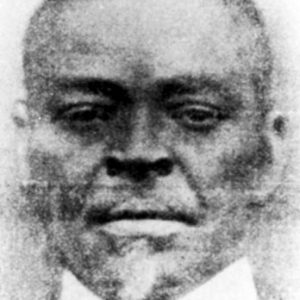calsfoundation@cals.org
Isaac Taylor Gillam (1839?–1904)
Isaac Taylor Gillam was an important African American leader in post–Civil War Little Rock (Pulaski County). His service on the Little Rock City Council, the Arkansas General Assembly (as a noted black legislator), and as Pulaski County coroner typified the strong interest black freedmen took in politics and elections for decades after the Civil War.
Isaac Gillam was born a slave in Hardin County, Tennessee. His birth date is unknown, but based upon surviving documents, he was probably born in 1839. Little is known of his life until September 15, 1863, when he enlisted in the Union army at Little Rock, five days after the city fell to Union troops. Gillam served in Company I, Second Regiment, Arkansas Infantry (later renamed Company I, Fifty-fourth Regiment, U.S. Colored Infantry). He immediately attained the rank of sergeant, probably in recognition of his leadership qualities, and possibly because he might have been at least minimally literate. After a three-year stint, Gillam was mustered out of the army at the rank of first sergeant.
About the time he left the army in 1866, Gillam married Cora Alice McCarrell, a fifteen-year-old native of Mississippi. They had eight children.
To provide for his growing family, Gillam turned to blacksmithing. Many slaves had been trained as smiths, and blacksmithing was likely a relatively open trade in post–Civil War Little Rock. In addition to blacksmithing, Gillam bred horses.
Gillam became active in Reconstruction politics, and by 1872, he held the political job of Little Rock city jailor. He later became a city policeman. When the Reconstruction Republican Party fell into bitter internal bickering, Gillam (like most African Americans) sided with the faction led by Joseph Brooks. When the Brooks-Baxter War erupted in 1874, Gillam was commissioned a captain in the Brooks militia.
Gillam entered active politics in April 1877, when he was elected to the Little Rock City Council, which represented the heavily black Sixth Ward. He served with another black Republican, Green Thompson. A surprising aspect of Gillam’s tenure on the council was his appointment by the white Democratic mayor, John G. Fletcher, to the Ways and Means Committee. Thompson was also on the three-member panel, so Gillam’s appointment gave black councilmen a majority on the committee that oversaw municipal spending.
Mundane matters, such as street paving and the construction of water cisterns, occupied much of Gillam’s time. During political bickering, Gillam and his fellow Republicans often allied with the Greenback Party councilmen to oppose their common enemy, the Democrats. The Greenback Party, a popular third party that attempted to improve the economic conditions of farmers and laborers through an inflation of the currency, swept the 1878 municipal elections in Little Rock. In April 1879, for example, Gillam nominated George Counts for city police chief. The Democrats put forth the name of J. H. Plunkett. An incredible 102 ballots were required before the Republican-Greenback coalition finally received a majority.
In 1878, Gillam successfully ran as a Greenback candidate for the Arkansas House of Representatives. For a brief time, Gillam served simultaneously as a Republican alderman and a Greenback legislator, but he was defeated by a Democrat for reelection to the city council in 1879.
Gillam’s tenure in the legislature was similar to his aldermanic service in its concentration on the day-to-day workings of the body. Because the conservative Democrats held a majority by a large margin, it was easy for them to stifle the Greenback-Republican minority. Gillam did occasionally rise to fight. On one occasion, he nominated a prominent black cleric for the post of house chaplain, noting that black citizens deserved more than the house janitor’s job.
Though he began his political career as a traditional Republican, Gillam’s career as a Greenback signaled his dissatisfaction with the Republican Party. In 1882, he switched to the Democratic Party and served two terms as Pulaski County coroner. In 1890, Gillam switched parties again and supported the Populist Party, an agrarian reformist movement. In that year, he was the Populist nominee for county coroner, but he lost. This defeat ended his elective political career, but it did not stop his search for a political home. He later completed the circle of party affiliation by returning to the Republican Party.
Gillam died suddenly on April 18, 1904. He is buried at the Little Rock National Cemetery. Gillam Park in Little Rock is named after him.
For additional information:
Dillard, Tom W. “The Gilliam [sic] Family, Four Generations of Black Arkansas Educators.” Journal of Arkansas Education 45 (1973): 19, 22.
———. “Isaac Gillam: Black Pulaski Countian.” Pulaski County Historical Review 24 (Spring 1976): 6–11.
Hagg, Beulah Sherwood. “Mrs. Cora Gillam.” In The American Slave: A Composite Autobiography, edited by George P. Rawick. Westport, CT: Greenwood Publishing Company, 1972.
Tom W. Dillard
University of Arkansas Libraries
 Politics and Government
Politics and Government Post-Reconstruction through the Gilded Age, 1875 through 1900
Post-Reconstruction through the Gilded Age, 1875 through 1900 Isaac Gillam
Isaac Gillam 



Comments
No comments on this entry yet.